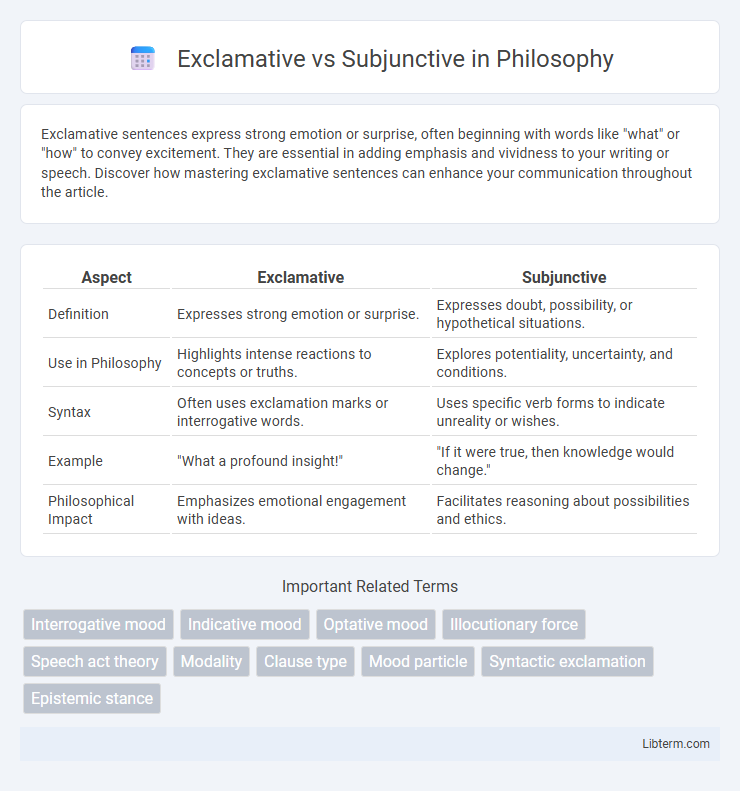Exclamative sentences express strong emotion or surprise, often beginning with words like "what" or "how" to convey excitement. They are essential in adding emphasis and vividness to your writing or speech. Discover how mastering exclamative sentences can enhance your communication throughout the article.
Table of Comparison
| Aspect | Exclamative | Subjunctive |
|---|---|---|
| Definition | Expresses strong emotion or surprise. | Expresses doubt, possibility, or hypothetical situations. |
| Use in Philosophy | Highlights intense reactions to concepts or truths. | Explores potentiality, uncertainty, and conditions. |
| Syntax | Often uses exclamation marks or interrogative words. | Uses specific verb forms to indicate unreality or wishes. |
| Example | "What a profound insight!" | "If it were true, then knowledge would change." |
| Philosophical Impact | Emphasizes emotional engagement with ideas. | Facilitates reasoning about possibilities and ethics. |
Understanding Exclamative and Subjunctive Sentences
Exclamative sentences express strong emotions or surprise, often beginning with words like "what" or "how," and end with an exclamation mark to emphasize intensity. Subjunctive sentences convey wishes, hypotheticals, or conditions contrary to fact, typically using verb forms such as "were" or "be" that differ from indicative mood. Mastering the distinction between exclamative and subjunctive sentences enhances clarity in emotional expression and grammatical accuracy in hypothetical or desired contexts.
Key Features of Exclamative Sentences
Exclamative sentences express strong emotions or reactions, often marked by an exclamation point and an intense tone. Key features include the use of words like "what" or "how" at the beginning, followed by a subject and verb that emphasize surprise, admiration, or disbelief. These sentences stand out by conveying emphasis through structure and punctuation, differentiating them from subjunctive sentences that express wishes, hypotheticals, or demands.
Defining the Subjunctive Mood
The subjunctive mood expresses wishes, hypotheticals, demands, or suggestions, often marked by verbs like "be," "were," or "suggest." It contrasts with the exclamative mood, which conveys strong emotions or reactions, typically introduced by exclamations such as "What" or "How." Understanding the subjunctive mood is essential for grasping nuanced expressions of desire, necessity, or possibility in English grammar.
Structural Differences: Exclamative vs Subjunctive
Exclamative sentences typically begin with words like "what" or "how," followed by a subject and verb in a declarative order to express strong emotion or surprise. Subjunctive sentences, on the other hand, often use a base verb form without inflection for tense, triggered by verbs or expressions that express wishes, doubts, or hypotheticals. The structural distinction lies in exclamatives emphasizing emotional intensity via interrogative words, while subjunctives rely on specific verb forms to convey non-real or desired situations.
Common Examples of Exclamative Sentences
Exclamative sentences often express strong emotions or surprise using structures beginning with "what" or "how," such as "What a beautiful day!" or "How amazing this is!" The subjunctive mood, in contrast, conveys wishes, hypotheticals, or demands, for example, "If I were you" or "I suggest that he leave early." Common exclamative sentences emphasize intensity and vividness, typically omitting verbs or inverting word order to enhance emotional impact.
Typical Use Cases for the Subjunctive Mood
The subjunctive mood is typically used to express doubt, wishes, hypothetical situations, or demands, such as in sentences like "If I were you" or "I suggest that he be on time." It frequently appears in subordinate clauses following verbs that convey necessity, recommendation, or uncertainty, including "recommend," "insist," and "doubt." In contrast to the exclamative, which emphasizes strong emotion or surprise, the subjunctive centers on subjective or non-real conditions in English grammar.
Grammatical Rules: Exclamative vs Subjunctive
Exclamative sentences express strong emotion or surprise and typically begin with words like "what" or "how," followed by an adjective or noun phrase, as in "What a wonderful day!" Subjunctive mood involves verb forms used to express wishes, hypotheses, or demands, often seen in clauses following verbs like "suggest," "recommend," or phrases like "if I were you." Key grammatical rules include using the base form of the verb in the present subjunctive ("I suggest that he go") and employing inversion or omission of auxiliary verbs in exclamatives ("How beautiful is the sunset!").
Contextual Usage in Written and Spoken English
Exclamative sentences express strong emotion or surprise, often starting with words like "what" or "how," and are common in both spoken and written English to convey emphasis. Subjunctive mood, primarily found in formal written English, expresses wishes, hypotheticals, or demands, using specific verb forms such as "be" instead of "is" in clauses like "If I were you." In spoken English, the subjunctive is less frequently used, often replaced by indicative forms, whereas exclamatives maintain their prominence for emotional expression across contexts.
Frequent Mistakes and How to Avoid Them
Exclamative sentences often cause confusion with subjunctive forms because both use verb moods that convey strong feelings or hypothetical situations. Frequent mistakes include mixing exclamative emphasis with subjunctive verb endings, such as using "were" in exclamations instead of simple past forms. To avoid errors, focus on the function: exclamatives express strong emotion with straightforward verb forms, while subjunctives convey wishes, doubts, or hypothetical scenarios requiring specific verb conjugations.
Summary: Choosing Between Exclamative and Subjunctive
Exclamative sentences emphasize strong emotions or surprise using structures like "What a beautiful day!" while subjunctive mood expresses wishes, hypotheticals, or demands with verbs in forms such as "If I were rich" or "It is essential that he arrive on time." Choosing between exclamative and subjunctive depends on context: exclamatives highlight intensity or admiration, whereas subjunctives convey uncertainty, possibility, or necessity. Understanding the purpose of the statement--emotional emphasis versus hypothetical or desired situations--is key to selecting the appropriate grammatical form.
Exclamative Infographic

 libterm.com
libterm.com